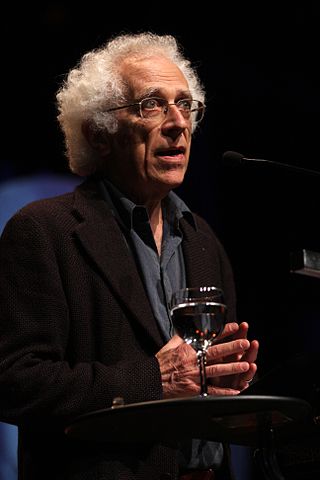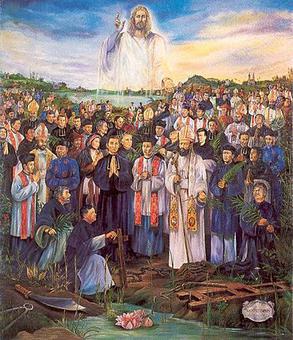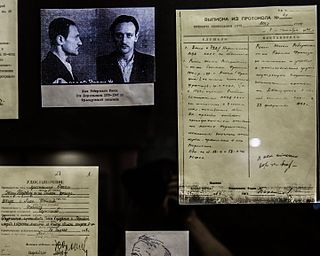
Aleksandr Isayevich Solzhenitsyn was a Russian author and Soviet dissident who helped to raise global awareness of political repression in the Soviet Union, especially the Gulag prison system. He was awarded the 1970 Nobel Prize in Literature "for the ethical force with which he has pursued the indispensable traditions of Russian literature". His non-fiction work The Gulag Archipelago "amounted to a head-on challenge to the Soviet state" and sold tens of millions of copies.

The Viet Cong was an epithet and umbrella term to call the communist-driven armed movement and united front organization in South Vietnam. Formally organized as and led by the National Liberation Front of South Vietnam and nominally conducted military operations under the name of the Liberation Army of South Vietnam (LASV), the movement fought under the direction of North Vietnam against the South Vietnamese and United States governments during the Vietnam War. The organization had both guerrilla and regular army units, as well as a network of cadres who organized and mobilized peasants in the territory the Viet Cong controlled. During the war, communist fighters and some anti-war activists claimed that the Viet Cong was an insurgency indigenous to the South that represented the legitimate rights of people in South Vietnam, while the U.S. and South Vietnamese governments portrayed the group as a tool of North Vietnam. It was later conceded by the modern Vietnamese communist leadership that the movement was actually under the North Vietnamese political and military leadership, aiming to unify Vietnam under a single banner.

The Gulag Archipelago: An Experiment in Literary Investigation is a three-volume non-fiction series written between 1958 and 1968 by Russian writer Aleksandr Solzhenitsyn, a Soviet dissident. It was first published in 1973 by the Parisian publisher YMCA-Press, and it was translated into English and French the following year. It explores a vision of life in what is often known as the Gulag, the Soviet labour camp system. Solzhenitsyn constructed his highly detailed narrative from various sources including reports, interviews, statements, diaries, legal documents, and his own experience as a Gulag prisoner.

Tzvetan Todorov was a Bulgarian-French historian, philosopher, structuralist literary critic, sociologist and essayist. He was the author of many books and essays, which have had a significant influence in anthropology, sociology, semiotics, literary theory, intellectual history and culture theory.

Tạ Thu Thâu (1906–1945) in the 1930s was the principal representative of Trotskyism in Vietnam and, in colonial Cochinchina, of left opposition to the Indochinese Communist Party (PCI) of Nguyen Ai Quoc. He joined to Left Opposition to the United Front policy of the Commintern as a student in Paris in the late 1920s. After a period of uneasy co-operation with "Stalinists" on the Saigon paper La Lutte, he triumphed over the Communists in the 1939 elections to the Cochinchina Colonial Council on a platform that called for radical land reform and workers' control, and opposed defense collaboration with the French authorities. He was executed by the Communist Viet Minh in September 1945.
Nguyễn Đan Quế is a Vietnamese endocrinologist and pro-democracy activist in Saigon. He was imprisoned from 1978 to 1988, 1990 to 1998, 2003 to 2005, and briefly in 2011 on state security charges related to his activism. In 2003, The New York Times described him as "Vietnam's most renowned dissident".
The phonology of Vietnamese features 19 consonant phonemes, with 5 additional consonant phonemes used in Vietnamese's Southern dialect, and 4 exclusive to the Northern dialect. Vietnamese also has 14 vowel nuclei, and 6 tones that are integral to the interpretation of the language. Older interpretations of Vietnamese tones differentiated between "sharp" and "heavy" entering and departing tones. This article is a technical description of the sound system of the Vietnamese language, including phonetics and phonology. Two main varieties of Vietnamese, Hanoi and Saigon, which are slightly different to each other, are described below.

Trương Như Tảng was a South Vietnamese lawyer and politician. He was active in many anti-South Vietnam organizations before joining the newly created North Vietnam-aligned Provisional Revolutionary Government of the Republic of South Vietnam as the Minister of Justice. He spent many years in the jungles near and in Cambodia until the Fall of Saigon in 1975. He quickly became disillusioned with the newly imposed North Vietnamese regime and escaped the reunited Socialist Republic of Vietnam via a boat in August 1978. He was sent to a refugee camp in Indonesia before moving to Paris, France, to live out his life in exile.
The Three Alls policy was a Japanese scorched earth policy adopted in China during World War II, the three "alls" being "kill all, burn all, loot all". This policy was designed as retaliation against the Chinese for the Communist-led Hundred Regiments Offensive in December 1940.

The Empire of Vietnam was a short-lived puppet state of Imperial Japan governing the former French protectorates of Annam and Tonkin between March 11 and August 25, 1945. At the end of its rule, the empire also successfully reclaimed Cochinchina as part of Vietnam.

Vietnamese Martyrs, or in the current Roman Missal as Saint Andrew Dung-Lac and Companions, also known as the Martyrs of Annam, Martyrs of Tonkin and Cochinchina, collectively Martyrs of Indochina, are saints on the General Roman Calendar who were canonized by Pope John Paul II. On June 19, 1988, thousands of Overseas Vietnamese worldwide gathered at the Vatican for the Celebration of the Canonization of 117 Vietnamese Martyrs, an event chaired by Monsignor Trần Văn Hoài. Their memorial is on November 24.

Trotskyism in Vietnam was represented by those who, in left opposition to the Indochinese Communist Party (ICP) of Nguyen Ai Quoc, identified with the call by Leon Trotsky to re-found "vanguard parties of proletariat" on principles of "proletarian internationalism" and of "permanent revolution". Active in the 1930s in organising the Saigon waterfront, industry and transport, Trotskyists presented a significant challenge to the Moscow-aligned party in Cochinchina. Following the September 1945 Saigon uprising against the restoration of French colonial rule, Vietnamese Trotskyists were systematically hunted down and eliminated by both the French Sûreté and the Communist-front Viet Minh.
Đoàn Văn Toại was a Vietnamese-born naturalized American activist and the author of The Vietnamese Gulag.

Jacques Rossi was a Polish-French writer and polyglot. Rossi was best known for his books on the Gulag.

La Lutte was a left-wing paper published in Saigon, French-colonial Cochinchina, in the 1930s. It was launched ahead of the April–May 1933 Saigon municipal council election as a joint organ of the Indochinese Communist Party (PCI) and a grouping of Trotskyists and others who agreed to run a joint "Workers' slate" of candidates for the polls. This kind of cooperation between Trotskyists and Comintern-linked communists was a phenomenon unique to Vietnam. The editorial line of La Lutte avoided criticism of the USSR while supporting the demands of workers and peasants without regard to faction. The supporters of La Lutte were known as lutteurs.
David Chanoff is an American author of non-fiction work. His work has typically involved collaborations with the principal protagonist of the work concerned. His collaborators have included Augustus A. White, Joycelyn Elders, Đoàn Văn Toại, William J. Crowe, Ariel Sharon, Kenneth Good and Felix Zandman, among others. He has also written about a wide range of subjects including literary history, education and foreign for The Washington Post, The New Republic and The New York Times Magazine.
Đoàn Viết Hoạt is a Vietnamese journalist, educator, and democratic activist who was repeatedly imprisoned for his criticisms of Vietnam's Communist leadership. He has received numerous international awards in recognition of his work, including the Robert F. Kennedy Human Rights Award, and is often referred to as the "Sakharov of Vietnam".

Nicolas Werth is a French historian.
Armand Maloumian (4 May 1928 – 24 June 2007 was a French Gulag prisoner in the Soviet Union and writer.

The National Social Democratic Front, later named the Social Democratic Alliance, was a South Vietnamese political party which was effectively a federation of different groups, united by their anti-communist stance. Its chairman was Lt. Gen. Nguyễn Văn Thiệu, leader of South Vietnam from 1965–1975.













